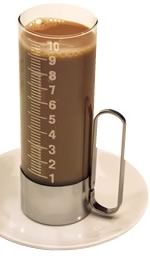 Over a weekend in June, Boston will host a very provocative conference. The first annual US Science Café hosted by NOVA scienceNOW will bring together producers of Science Cafés for the first time in the United States to network and share best practices.
Over a weekend in June, Boston will host a very provocative conference. The first annual US Science Café hosted by NOVA scienceNOW will bring together producers of Science Cafés for the first time in the United States to network and share best practices.
But what is a Science Café? It is a simple and compelling concept with an international history. A group of people interested in science meet monthly in a café setting to listen to a speaker for 20 minutes and then ask questions and launch into a discussion about the topic at hand. Across San Francisco, and the greater nation, Science Cafes are bringing science to the masses over a glass of wine or a piping latte.
For example, a local café called Ask a Scientist is presenting topics ranging from Ancient American Astronomy to How Computers Look at Art. Ask a Scientist, along with a great number of San Francisco Science Cafés, are also now in close communication. A San Francisco umbrella organization was set up to keep café producers appraised of interesting topics and available speakers. The conference is working on the umbrellas concept by bringing together a large community of producers to network and sharing ideas. Its aim is to create solid support to these independent cafes in order to keep the momentum going.
Although this is the first conference in the United States, Science Cafes have a longer, international history. Café philosophique was the first inkling of a science café. It was a grassroots forum for philosophical discussion, founded by philosopher Marc Sautet in Paris, France in the 1990's.
This concept was applied to café scientifique in 1998. Duncan Dallas, café founder, got the idea for the scientific forum from reading the obituary of Marc Suatet. He set up his first meeting in a wine bar in Leeds, England. Café scientifiques started popping up all over England and they were able to secure funding from the Welcome Trust because of their success. Now café scientifique is a recognized international movement linking those interested with cafes not only in England but through the rest of the world. Café scientifique provides seed funding to cafes in England and also provides resources and expertise to make forums successful in other countries.
